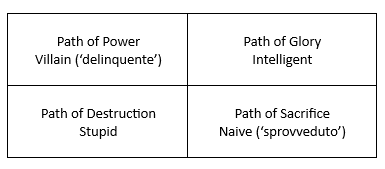Disclaimer: This post contains concepts and thoughts related to an extremely sensitive topic, religion; I invite the reader to consider that we are dealing with a topic important for many people applied to roleplaying games; it is not my intention to offend anyone's sensibilities, I am only interested in providing serious insights into aspects related to morality and religion in the setting of a roleplaying game.
The starting point for this post is this online article that I encourage everyone to read because it is interesting. The main point is that, according to scientific studies, religious morality (in a general sense) is derived from morality, not the other way around. I find this reasoning very reasonable and based on accurate scientific studies. What is missing at the end of the argument is a part that was clearly not in the scope of the study of the article I linked: religion extends the universal principles of cooperation that define morality. I do not want to go up in the dissertation, I want to stay very grounded in the basic elements; I start with the cooperative principles that are universally considered morally good which are according to the article: these are help your kin, be loyal to your group, return favors, be courageous, obey superiors, share things fairly, and respect other people's property. Of these principles, I consider, for example, the Christian religion (the choice is guided by the simple fact that I know it well enough to use it in this sensitive context). Religion has, in effect, taken all the principles and expanded them: the scope of good moral principles such as "your kin" and "your group" has become "any kin" and "any group". This change is outside the universal patterns defined in the article; it is an expansion of the scope associated with a principle that it is necessary to behave in a good way towards everyone. I will not go into the details underlying this difference between "basic" moral principles and religious moral principles. I simply agree with the conclusion that morality, understood as universal principles of cooperation, can exist independently of religion.
The proof is what can be observed in the definition of morality can also be found in Path's definitions with respect to Carlo Cipolla's thought; in the picture here below I added, along with the VI·VIII·X Paths, the definitions created by Cipolla for the same quadrant (which are the base of the VI·VIII·X Paths!):
If we assume that intelligent is synonymous with good, then the parallelism between universal principles of cooperation and the moral orientation of VI·VIII·X is obvious. The move towards a religion such as Christianity makes it clear that "expanded" religious morality seems to make illogical some dictates that are absent from "basic" morality: a Christian gesture of helping a stranger in distress, which might be detrimental to oneself, is called "good" in the former case, and "naive" in the latter (where the idea of good was matching with intelligent). No further comment is needed to understand the difference that religious morality can have from morality dictated by universal principles. Not surprisingly, even the article clearly reports that the relationship between religion and morality is complex and varies across cultural traditions.
Finally, I will try to anticipate how I wanted to deal with morality and religion in the setting of the KUP RPG VI·VIII·X (the book entitled 'Imago Mundi' is on the way, but far from being published): morality in the game region (which corresponds to a larger area of Europe, corresponding to the territory of the now decayed Empire of Roburia) was defined by Philodemos, the most enlightened citizen for more than a millennium. He defined seven rules of democracy, the basis of civilized coexistence, and asked the people who inhabited the land to adhere to them in order to achieve the ideal civilization.
These 7 rules are similar to those described in the article (they are not the same, of course, mine are more fallacious) and imply that the morals of the humans in the game follow universal principles of cooperation. In addition, another distinguished citizen named Boemo defined the two cardinal principles of religion: whatever religion a person chooses to follow, it is to be understood as a personal matter, and consequently religious worship is to be celebrated individually by individuals, while avoiding collective celebration.
I am convinced that I have created a game with a very solid underlying morality and, at the same time, a more secular and less 'transcendental' concept of religion... even though both Philodemos and Boemo, by virtue of their deeds and what they have achieved, have essentially risen to the rank of immortals and are now Electi... but this is another story.






There's some good stuff here! There's also at least 2500 years of philosophy written on these points. Consider how widespread virtue and vice terms are. Courage, justice, wisdom, and self-control vs. cowardice/recklessness, injustice, folly, and indulgence. Almost no philosophers think we need religion to be moral, and I'm glad to see others are tackling this issue in a commonsense and reasonable manner. Nice work.